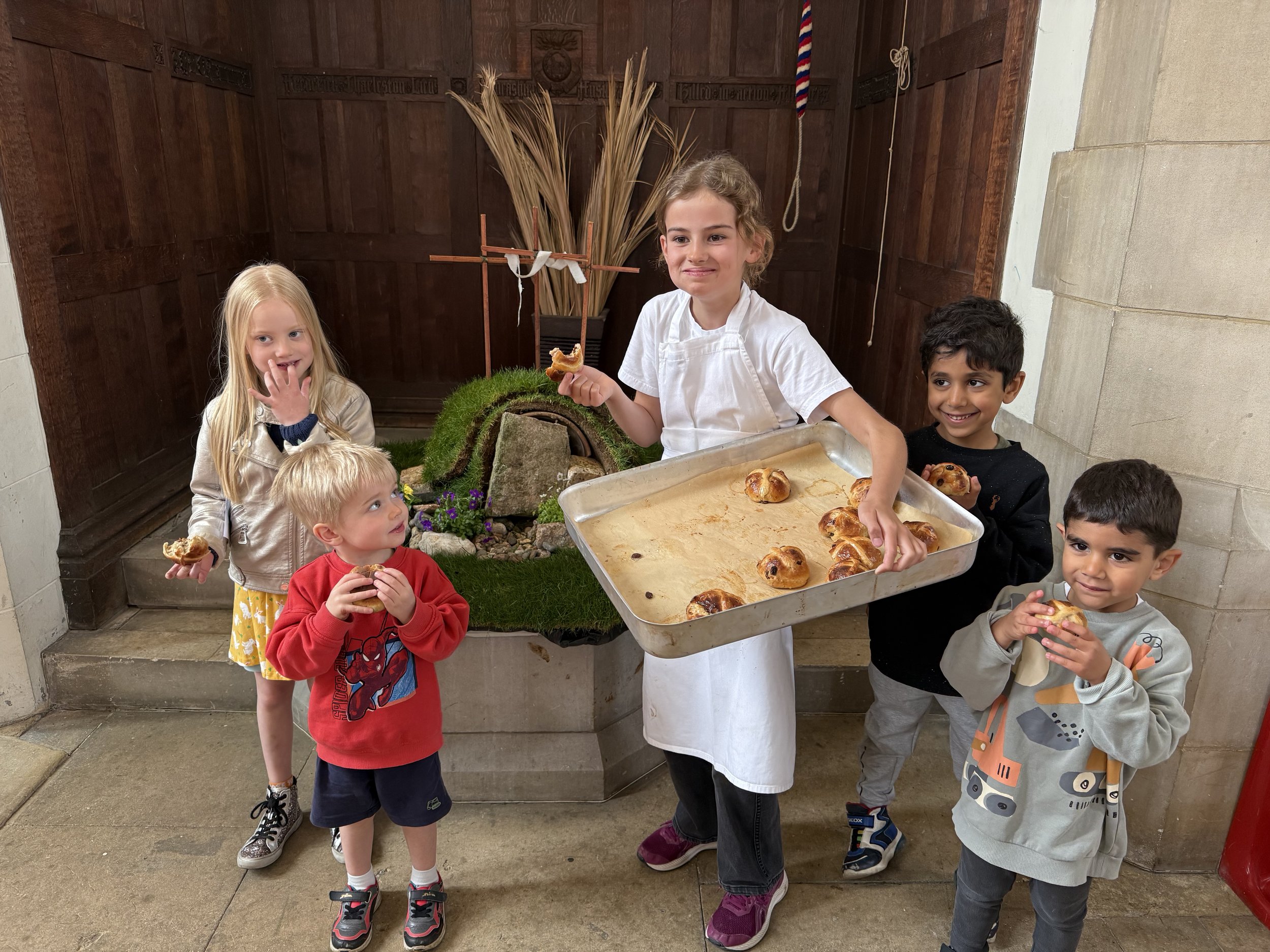
Easter begins
Join us on Good Friday 18th April at 12 noon for Stations of the Cross and at around 1.15pm for the Good Friday Liturgy.
On Easter Sunday 20th April we mark the rising of Christ with a Dawn Service with Easter Fire at 5am and our Easter Day Festival Mass at 10.30am.

Ascension & APCM
“Every year each parish church is obliged to hold an Annual Parochial Church Meeting (APCM) before the end of May. At this meeting we receive the accounts and reports for the previous year and elect those who will serve us in the year ahead.
We hold the APCM within the Parish Eucharist service so that we can look back at all we have done and look forward to all that we hope to do; show our gratitude for everyone who works to serve God and our community; and pray for those committing to serve in the year ahead. The essential business items are covered in the first part of the service and, in place of a sermon, members of the parish will give a brief overview of last year.
This year the APCM falls on the Sunday we celebrate the feast of the Ascension. The story of our salvation begins with the Incarnation when Jesus brings God to be with us in the heart of human life. At the Ascension Jesus takes us with him into the heart of God. This does not mark the ending of Christ’s earthly ministry but its new beginning in us: Our concerns are God’s concerns and God’s concerns are ours. In Luke 24: 44-53, Jesus addresses his disciples: they will no longer see him as one particular person, Jesus of Nazareth, but he will now be present in all those who follow him. “See, I am sending you what my father promised” you will be “clothed with power from on high”. Christ is not absent; Christ is present here with us and in us as we commit ourselves to take God with us into the life our community and bring a little bit of heaven to our patch of earth.

Dawn Service of Light
Our dawn service starts before the sun has risen at 5am when we light the Paschal Candle from the new Easter fire outside of the church and carry the light of Christ into the dark church. It’s worth getting up early for this magical service where we sing the first alleluia of Easter by candlelight.

10:30 Family Service for The Christ is King
It is pretty easy to distinguish a sheep from a goat. It is also pretty easy to distinguish a king from his subjects, one with power from one with no power: those being served have power and authority, those serving them do not. It’s all pretty binary and straightforward. But what happens when the sheep start acting like goats and the goats like sheep? Today we celebrate the feast of Christ the King. At first sight, the Kingdom of God looks pretty binary too: the sheep are in, the goats are out, those who serve are in and those who do not are out. Jesus has just given power to those who do not have it and taken it from those who do. But Jesus never takes power from anyone or exerts power over anyone. Instead, he offers everyone the opportunity to use their own power. When we choose to use our power to serve, not those with power but those without power; when we give voice to the voiceless, champion the weak and care for those in need, we become part of the Kingdom of God.

10:30 Family Service for The Twentieth Sunday After Trinity
There is a sense in which Jesus is being just a bit too clever in today’s gospel reading, Matthew 22:15-22. He avoids giving a straight answer to the question he is asked, instead he raises yet more questions. What does belong to the emperor? And what does belong to God? Which leads to yet more questions, not about our relationship to authority and the state but questions about our relationship to God, to ourselves and to others. When Jesus shows them the coin, he notes that it bears the emperor’s image. What then bears God’s image? The obvious answer is us, humanity, made in the image of God. The pharisees have noticed that Jesus “does not regard people with partiality”. All bear the image of God, therefore no one is more or less valuable than anyone else. If we to give to God the things that are God’s then we are to be given to God; our lives are not our own, they are a gift to be used to grow more and more into the likeness of Christ.

9am Family Service for The Sixteenth Sunday After Trinity
It’s not fair! is a constant cry in childhood but adults are not so very different. In today’s gospel, Matthew 20: 1-16, Jesus tells the beautiful parable of the workers in the vineyard. The early workers are happy with the daily wage that they have agreed with the landowner … until the workers who have worked less hours than them receive the same wage. God, it turns out, is not in the business of fairness. But we are, we want reward for our efforts, we want our talents valued and appreciated. The kingdom of God, however, is not a meritocracy. God doesn’t not care how hard we have worked, God wants everyone, the lazy as well as the industrious, the bad as well as the good, to enjoy God’s gifts. God is not fair, God is generous.

10:30 Family Service for The Twentieth Sunday After Trinity
The truth will set you free, but first it will really p*ss you off! Both of our readings today speak honestly about the difficulties of following the truth. Jeremiah, in 20:7-13, knows that speaking out will land him in trouble, people only want to hear good news and he is charged with speaking truth to power and yet he feels compelled to speak. In Matthew 10:24-39, Jesus is also compelled to speak hard words: I have not come to bring peace, but conflict. In truth the conflict is not between father & son, mother & daughter, but rather between those who are prepared to confront the impact that their choices has on others and the world around them and those who desire to remain ignorant. Speaking out has never been easy (I know, my foster daughter was arrested AGAIN last week for protesting climate policies). We are asked to live out the truth we believe, whatever the cost, knowing that in doing so we are living in and with God who reveals the truth in love.

9am Family Service for The Seventh Sunday After Trinity
The truth will set you free, but first it will really p*ss you off! Both of our readings today speak honestly about the difficulties of following the truth. Jeremiah, in 20:7-13, knows that speaking out will land him in trouble, people only want to hear good news and he is charged with speaking truth to power and yet he feels compelled to speak. In Matthew 10:24-39, Jesus is also compelled to speak hard words: I have not come to bring peace, but conflict. In truth the conflict is not between father & son, mother & daughter, but rather between those who are prepared to confront the impact that their choices has on others and the world around them and those who desire to remain ignorant. Speaking out has never been easy (I know, my foster daughter was arrested AGAIN last week for protesting climate policies). We are asked to live out the truth we believe, whatever the cost, knowing that in doing so we are living in and with God who reveals the truth in love.

9am Family Service for The Third Sunday After Trinity
The truth will set you free, but first it will really p*ss you off! Both of our readings today speak honestly about the difficulties of following the truth. Jeremiah, in 20:7-13, knows that speaking out will land him in trouble, people only want to hear good news and he is charged with speaking truth to power and yet he feels compelled to speak. In Matthew 10:24-39, Jesus is also compelled to speak hard words: I have not come to bring peace, but conflict. In truth the conflict is not between father & son, mother & daughter, but rather between those who are prepared to confront the impact that their choices has on others and the world around them and those who desire to remain ignorant. Speaking out has never been easy (I know, my foster daughter was arrested AGAIN last week for protesting climate policies). We are asked to live out the truth we believe, whatever the cost, knowing that in doing so we are living in and with God who reveals the truth in love.


Evensong on The Feast of Pentecost
On Sunday 28th May at 6.30pm in church, our monthly choral Evensong service with Holy Communion

9am Family Service for The Feast of Pentecost
The Feast of Pentecost.
Acts 2.1-21 tells the story of the coming of the Holy Spirit. Of course, the Holy Spirit has been around since the creation but it has been the preserve of a few: those called to lead and serve the people, priest and kings. Now the Holy Spirit is for everyone: all genders, all ages, all socio-economic groups. The whole people of God are called to lead and to serve. It is the sharing and the exercising of this gift by the entire community is what will bring new life and renewal: In John 20.19-23 Jesus breathes the spirit on his disciples recalling the spirit of God being breathed into humanity in the very beginning. It marks the potential for a new beginning, a new creation in which all God’s children are valued and included.

Seventh Sunday of Easter
Today we celebrate the Ascension. Over the last few weeks our reading shave focused on where God is to be found. Just as the Nativity shows God descending to dwell with us, so the Ascension shows us ascends to dwell with God. Both revealing that humanity and divinity are to be found together, God is not far from us but as close to us are the beat of our hearts. The question then is not, where is God? but where are we? In both Luke 24:44-53 and Acts 1:1-11 Jesus sends the disciples back into the world, not just to their people, but to all peoples. We are now the human being who can carry the transforming power of God with us. Why then do we so often persist in “stand looking up to heaven” when Jesus is sending us to witness to whole world?

Sixth Sunday of Easter
“You have made us for yourself, O Lord, and our hearts are restless until they find their rest in you.” This week’s readings, like last week’s, explore our desire for God and God’s desire for us.
In John 14:15-21, Jesus repeatedly reassures us that that we are not alone, not “orphaned” because God’s deepest desire is to dwell in us. Our journey into God starts with discovering our own belovedness. As we are loved into being we recognize the beloved nature of all God’s children without exception and discover God in one another.

Fifth Sunday of Easter
The life of the risen Christ takes root in us slowly.
In our readings today, we hear how it impacted those who first heard it. In Acts, 2:14a, 36-41, there is sorrow and regret. Peter explains that what is required is the desire to change, to repent, to turn around and be prepared to start again. Yet there is something that must come before this:
In Luke 24:13-35, the disciples on the road to Emmaus, must first voice their disappointment, their crushed hopes “we had hoped”, they say “that he was the one to redeem Israel”. It only when they can let go of their own hopes that they are ready to receive the altogether larger, all encompassing hope that Jesus offers them, not just for their own people, but for all God’s children.

Evensong for the Fourth Sunday of Easter
On Sunday 30th March at 6.30pm in church, our monthly choral Evensong service.

9am Family Service for the Fourth Sunday of Easter
It’s Good Shepherd Sunday: this year’s reading focuses not just on the sheep and the shepherds, but the sheep fold and, in particular, the gate to the fold.
We are used to hearing the sheep and shepherd stories: we understand that God promises to care for us as a shepherd cares for her flock and that we are also called to be shepherds of God’s people, caring for others. When Jesus calls himself the sheep gate, though, things get trickier. Gates open both ways: they open and close, they allow for the sheep to go in and go out.

Third Sunday of Easter
The life of the risen Christ takes root in us slowly.
In our readings today, we hear how it impacted those who first heard it. In Acts, 2:14a, 36-41, there is sorrow and regret. Peter explains that what is required is the desire to change, to repent, to turn around and be prepared to start again. Yet there is something that must come before this:
In Luke 24:13-35, the disciples on the road to Emmaus, must first voice their disappointment, their crushed hopes “we had hoped”, they say “that he was the one to redeem Israel”. It only when they can let go of their own hopes that they are ready to receive the altogether larger, all encompassing hope that Jesus offers them, not just for their own people, but for all God’s children.

Second Sunday of Easter
Jesus has done his job and now the task of living the resurrection is handed over to us.
We are not expected to do this on our own: both of today’s readings focus on the gift of the Holy Spirit that the risen Christ sends us. For Peter, Acts 2:14a, 22-32, this is a dramatic and powerful gift: he recalls the prophet Joel promising that the spirit will be poured out on all people: old and young, men and women, slave and free.
This gift allows us to dream new dreams and envisage a new future for all God’s people. For the disciples, gathered together in fear after Christ’s death, John 20:19-end, the receipt of this gift is an altogether more gentle affair. Christ breathes the spirit on them. It begins with assuring us that we are forgiven; that the worst we can do does not have to be the last word; that even places of despair and hopelessness can be places of redemption and renewal.

Easter Day
The Day of Resurrection! Our dawn service starts before the sun has risen at 5am when we light the Paschal Candle from the new Easter fire outside of the church and carry the light of Christ into the dark church. It’s worth getting up early for this magical service where we sing the first alleluia of Easter by candlelight.
Our Festival Easter Mass starts at 10.30am. Here we bless the Easter garden and renew our baptismal vows: we die with Christ and are raised by him into new life.
Our readings for both services celebrate the mystery of a God who raises the dead to life with Peter’s proclamation of the resurrection in Acts 10. 34-43 and Matthew’s telling of the discovery of the empty tomb and the first meeting with the risen Christ (Matthew 28. 1-10).
